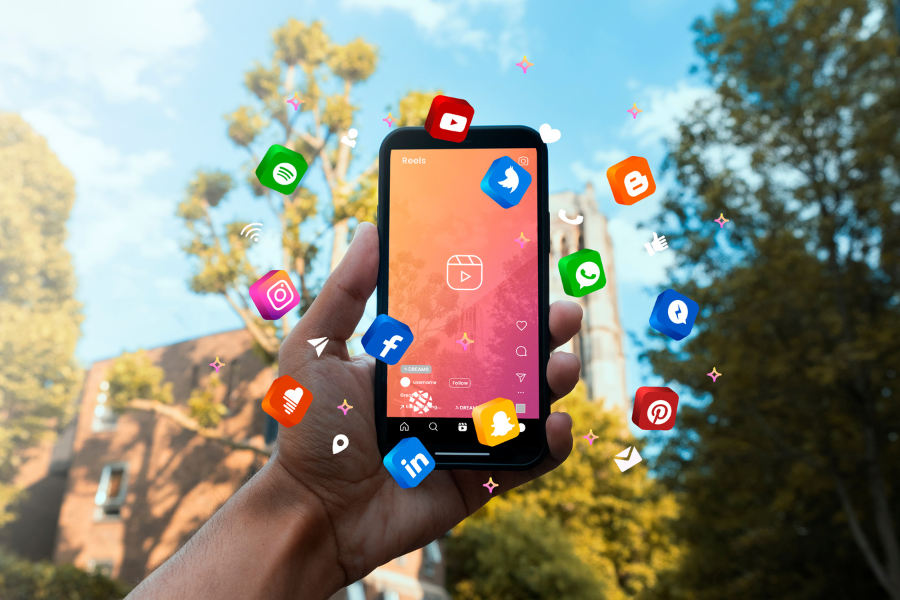The Power of Social Media: Strategies for Success & Impact
by Admin | April 14, 2025

The Power of Social Media: Strategies for Success & Impact
Social media has become an integral part of our daily lives, with billions of users engaging across different platforms. On average, people spend around 2 hours and 31 minutes per day on social media, with platforms like Facebook, Instagram, YouTube, and LinkedIn consuming a significant portion of their time. Instagram users spend around 30 minutes scrolling through content, while YouTube sees an average watch time of over 40 minutes per session.
For brands, this presents an unparalleled opportunity to reach and engage with their target audience. A well-planned social media strategy can enhance brand visibility, build a loyal community, and drive conversions. The key to success lies in creating engaging content that excites the audience and boosts reach, from interactive videos to user-generated content and influencer collaborations.
What Does Social Media Include?
Social media encompasses a variety of platforms, including:
- Social Networking Sites: Facebook, LinkedIn
- Photo and Video Sharing Platforms: Instagram, YouTube
- Microblogging Platforms: Twitter, Threads
- Professional Networking Sites: LinkedIn
- Discussion Forums: Reddit, Quora
Each platform serves a unique purpose, allowing brands to tailor their content to maximize engagement and attract customers.
The Power of Unique Ideas: Successful Social Media Campaigns
To stand out in the crowded digital space, brands need to develop unique and creative ideas. One of the most iconic social media campaigns was Coca-Cola’s ‘Share a Coke’ campaign. By personalizing Coke bottles with people’s names, the brand encouraged user-generated content and social sharing, making it a viral sensation worldwide.
Similarly, Nike’s ‘You Can’t Stop Us’ campaign used powerful visuals and storytelling to engage audiences, making it one of the most successful marketing initiatives in sports branding.
Benefits of Having a Social Media Strategy
A well-defined social media strategy helps brands:
- Increase Brand Awareness: This is like putting up a nice, eye-catching sign in the town square. By consistently posting interesting and engaging content (like photos of your products, behind-the-scenes glimpses, or fun facts), more people will notice your "store" and become familiar with your brand.
- Enhance Customer Engagement: This is like chatting with people who stop by your booth in the square. Social media allows you to talk directly to your customers, answer their questions, respond to their comments, and build a relationship with them. This makes them feel valued and builds trust, leading to loyalty.
- Generate Leads and Conversions: This is like offering samples or special deals in the town square to get people to come into your store. Social media ads and working with influencers (people who are popular online) can help you reach potential customers and encourage them to buy your products or services.
- Improve Customer Insights: This is like keeping track of which signs in the square attract the most attention. Social media analytics give you data about what kind of content your audience likes, what they're saying about your brand, and who they are. This helps you understand your customers better and make smarter decisions about your marketing.
- Boost Website Traffic: This is like putting up signs in the square that point people to your store. By including links to your website, blog, or product pages in your social media posts, you can drive more people to your online store and increase traffic.
What does a Social Media Strategy Include?
A social media strategy is a comprehensive plan that outlines your goals, tactics, and metrics for using social media to achieve your business objectives. It should include the following:
- Goals: What do you want to achieve with social media? Do you want to increase brand awareness, generate leads, drive sales, or build a community?
- Target audience: Who are you trying to reach with your social media content? What are their interests, needs, and pain points?
- Platforms: Which social media platforms are most relevant to your target audience?
- Content: What type of content will you create and share? How will it be engaging and valuable to your audience?
- Engagement: How will you interact with your audience and build relationships with them?
- Metrics: How will you measure the success of your social media strategy? What key performance indicators (KPIs) will you track?
A well-defined social media strategy will help you use social media effectively to achieve your business goals. It will also help you stay organized and focused, and make the most of your time and resources.
Successful Social Media Campaigns Across Different Sectors
- B2B (Business-to-Business): Tata Consultancy Services (TCS) and their LinkedIn thought leadership content effectively establish their expertise in IT and consulting. TCS engages with business professionals by sharing valuable insights, case studies, and tech trends, positioning itself as an industry leader.
- B2C (Business-to-Consumer): Zomato’s quirky Twitter engagement has set a benchmark for social media marketing in India. Their witty tweets, interactive polls, and humorous take on trending topics keep users engaged, creating a strong brand recall. Additionally, Amul’s creative topical advertisements have been a consistent hit among Indian audiences for decades.
- D2C (Direct-to-Consumer): Mamaearth’s influencer-led marketing strategy on Instagram and YouTube has propelled its success in the skincare industry. By leveraging digital influencers and user-generated reviews, Mamaearth has built trust and credibility among its consumers, leading to strong brand loyalty and higher conversions.
- Non-Profit Organization: The 'Bell Bajao' campaign by Breakthrough India aimed at raising awareness about domestic violence. This initiative encouraged people to intervene when they witnessed violence against women. With strong storytelling and social engagement, the campaign gained immense traction and successfully brought attention to the cause.
Conclusion
Social media is a powerful tool for brands, regardless of industry. By implementing a strategic approach, creating engaging content, and leveraging successful campaign insights, businesses can unlock immense potential and achieve their goals. Whether in B2B, B2C, D2C, or non-profit sectors, social media remains a game-changer in today’s digital landscape. Indian brands like Zomato, Amul, TCS, and Mamaearth have showcased how a well-thought-out social media strategy can drive significant engagement and business growth. If you're looking to leverage the power of social media for your brand, you can partner with our digital marketing agency, Why Shy? , who specialize in crafting effective social media strategies and can help you keep up with the latest trends and strategies of social media.
FAQs
- What are some common mistakes businesses make on social media?
One common mistake is not having a clear strategy. Businesses often post without a defined goal or target audience, leading to ineffective campaigns. Another mistake is neglecting customer engagement. Failing to respond to comments or messages can damage brand reputation and customer trust. Finally, inconsistent posting schedules can lead to decreased visibility and engagement.
- How can I measure the ROI of my social media marketing efforts?
Measuring ROI involves tracking key metrics like website traffic, lead generation, and conversions. You can use analytics tools provided by the social media platforms themselves or third-party tools to monitor these metrics. By correlating social media activities with business outcomes, you can determine the effectiveness of your campaigns and calculate the return on your investment.
- How often should I post on social media?
The ideal posting frequency varies depending on the platform and your target audience. It's crucial to find a balance between staying top-of-mind and overwhelming your followers. Experiment with different posting schedules and analyze your engagement metrics to determine the optimal frequency for your brand.
- What is the importance of visual content in social media marketing?
Visual content, such as images and videos, is highly engaging and can capture attention more effectively than text-based posts. It can also help convey complex information in a concise and easily digestible format. Incorporating high-quality visuals is crucial for creating impactful social media campaigns.
- How can I use social media to build a strong brand community?
Building a strong brand community involves fostering meaningful interactions with your followers. Respond to comments and messages, run contests and giveaways, and create content that encourages user participation. By creating a sense of belonging and value, you can cultivate a loyal community around your brand.
- What are some effective ways to use social media advertising?
Social media advertising allows you to target specific demographics, interests, and behaviors, making it a highly effective way to reach your ideal customers. Experiment with different ad formats and targeting options to optimize your campaigns and maximize your return on ad spend.
- How can I stay up-to-date with the latest social media trends?
The social media landscape is constantly evolving, so it's important to stay informed about the latest trends and best practices. Follow industry blogs, attend webinars, and engage with other marketers to keep your knowledge current and your strategies effective.
- What is the role of influencer marketing in social media?
Influencer marketing involves partnering with individuals who have a large and engaged following on social media to promote your brand or products. Influencers can help you reach a wider audience, build credibility, and drive conversions. However, it's crucial to choose influencers who align with your brand values and target audience.



